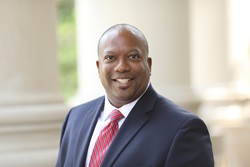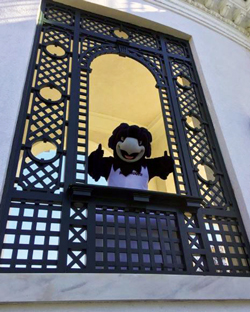Claude E. Taylor is a lecturer of communication and the Advisor-in-Residence for Academic Transition and Inclusion at Monmouth.
A native of Asbury Park, NJ, Taylor was born to his mother Audrey Taylor, a Jamaican immigrant, and father Roosevelt Taylor who was from North Carolina.
Upon graduating Red Bank Catholic High School at 17, he decided to continue his academic and athletic career at West Chester University of Pennsylvania playing football.
“I was not a starter, but our program was coached by legendary PSAC coach Danny Hale, who emphasized that my role on the practice squad was as important as the starting players,” said Taylor.
Taylor only played three out of the four years at West Chester because he was unable to balance academics and athletics. Since he was not a scholarship player, he relied heavily on his education.
“I highly value the student-athlete experience, but it does sometimes call for sacrifices that are hard to make,” Taylor shared.
Taylor graduated from West Chester with a bachelor’s degree in speech communication and a master’s degree in communication studies.
“I was drawn to communication when I was young, and my college education was a life-changing experience. I was fortunate to be selected to be the commencement speaker and deliver the commencement address on behalf of the undergraduate class at my graduation,” he said.
Taylor came to Monmouth shortly after college. He then left to study at Rutgers University as a doctoral candidate in media studies and communication. While at Rutgers, he was also a graduate fellow at the Eagleton Institute of Politics from 2002-2003.
“I was well-prepared to teach communication and media studies in my time at Rutgers, and I learned a lot about the complexity of higher education as well. This all influences me to this day in my teaching and advising at Monmouth,” said Taylor.
Although Taylor finished his doctoral coursework, he was unable to receive a doctorate, due to limited research funding and his dissertation advisor leaving for another institution. He is currently putting the degree on hold.
He decided to come back to Monmouth in 2005 as a faulty lecturer.
“It was good that Monmouth had small class sizes so that I didn’t get overwhelmed. As a graduate assistant in my program at West Chester, we were able to shadow faculty in our department and also co-teach small sections of 100 level courses in the summer. This is part of what made me a strong candidate when I applied to MU,” said Taylor.
In 2011, Taylor was appointed to the role of Athletics Professor-in-Residence which was a new position, and began his current role as Advisor-in-Residence for Academic Transition and Inclusion in 2017.
Taylor’s job role has been to support Monmouth students with the academic adjustment of college.
Jennifer Shamrock, Ph.D, a lecturer of communication, said, “Taylor possesses all the qualities one hopes for in a colleague. He has great compassion for others and genuinely seeks to understand the perspectives and experiences of others.”
“I think Taylor’s expansive involvement in issues of diversity and inclusion on campus shows the depth of his commitment to MU students and helping to create a campus where everyone feels valued, appreciated, and accepted,” Shamrock continued.
Christi Ruggiero, a senior communication student, admires Taylor’s passion for the field of communication. “He encouraged my class to take pride in our major, which is something that has stuck with me throughout the semester,” said Ruggiero.
“Along with his enthusiasm, Professor Taylor works closely with a group on campus that helps first generation college students adjust as freshmen. As the first to attend college in my family, I think it’s really awesome that he dedicates his time to an organization that celebrates people in my position,” Ruggiero added.
At Monmouth, Taylor has taught a wide-range of courses in the communication studies area from 100 to 400 level courses.
“Monmouth is a place that provides students and faculty the opportunity to explore their potential in a supportive environment,” said Taylor.




